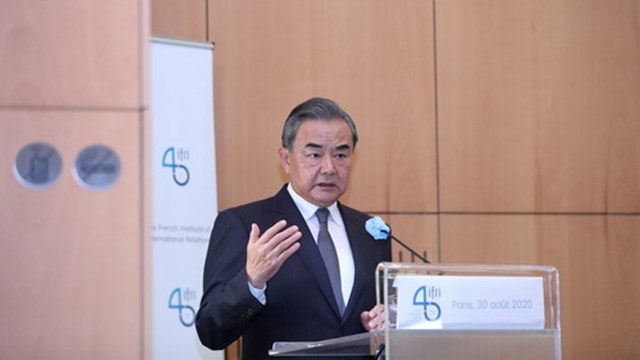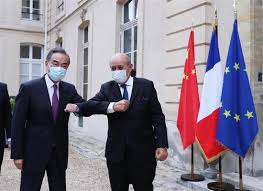Lies and rumors against China bound to be debunked by facts: Chinese FM

Paris: Lies and rumors about China’s response to climate change or its policies on Xinjiang and Hong Kong are bound to be debunked by facts, visiting Chinese State Councilor and Foreign Minister Wang Yi has said at the French Institute of International Relations in Paris.
Wang made these remarks on Sunday when responding to a question by a member of the European Parliament who claimed that China’s deeds and words are not consistent on climate change and that China’s policies on Xinjiang and Hong Kong are not in line with the values of the European Union.
On climate change, Wang said, “we are not only clear but also resolute in our actions.”
“First of all, despite pressure from various parties, we stood firmly with France and facilitated the signing of the landmark Paris Agreement,” he said
“Secondly, China has achieved the 2020 target of emission reduction two years ahead of schedule.”

The share of non-fossil energy in China’s total energy consumption has risen to nearly 15 percent; the installed capacity of renewable energy accounted for 30 percent of the world’s total, making up 44-percent of the global increase, Wang explained.
What’s more, he noted, over half of the world’s new energy vehicles are now running on Chinese roads, and a quarter of the world’s newly afforested area since 2000 is in China.
“Thirdly, we have not stopped there,” Wang added. “China is making new plans with long-term goals based on the new ecological needs of the country.”
“These facts and figures show that China does what it says. It is also a fact that the air quality in Beijing is getting better and better,” he said.
On the situation in Hong Kong, Wang said: “It is China’s internal affairs and no foreign country has the right to interfere. We never discuss the internal affairs of other countries, as we believe that all governments will run their own affairs well and fulfill their due responsibilities.”
He went on to explain that the law on safeguarding national security in Hong Kong was promulgated to fill a major loophole in Hong Kong’s legal system and has contributed to making Hong Kong a safer and more stable place.
“Since the second half of last year, the world has seen the chaos in Hong Kong — its Legislative Council being smashed, subway paralyzed, innocent people being injured, and a lawmaker being stabbed in a terrorist attack. If the chaos continues, Hong Kong will have no future and the ‘one country, two systems’ policy can hardly be sustained,” said Wang.
“Any country, including France, must have laws to safeguard national security. And this is the authority of the central government. You can’t just sit back and watch this chaos continue,” he said.
After the National People’s Congress, China’s top legislature, decided to fill this major loophole in Hong Kong’s legal system, nearly 3 million citizens in Hong Kong offered their signatures in support. And since the national security law for Hong Kong was implemented, nearly 80 percent of Hong Kongers believe that the city is getting safer and more stable, Wang added.
Moreover, chapter I of the national security law for Hong Kong clearly states its goal of “ensuring the resolute, full and faithful implementation of the policy of ‘one country, two systems’,” Wang said.
He said the national security law for Hong Kong also clearly stipulates that human rights shall be respected and protected in safeguarding national security in Hong Kong, including the rights and freedoms which Hong Kong residents enjoy under the Basic Law of HKSAR and the provisions of the International Covenant on Civil and Political Rights and the International Covenant on Economic, Social and Cultural Rights as applied to Hong Kong.
Therefore, the promulgation and implementation of the national security law for Hong Kong will not only safeguard the basic rights and freedoms of Hong Kong residents, but will also ensure the implementation of “one country, two systems” in a more stable and sustainable way, said Wang.
At the same time, all foreigners and foreign companies in Hong Kong will enjoy full legal protection, he added.
Regarding Xinjiang, one of China’s autonomous regions bordering Afghanistan, it used to be a channel for international terrorist forces to penetrate into China, Wang said.
Over the years, Xinjiang was hit by several thousand violent terrorist attacks, which caused hundreds of casualties among innocent people including Uygur residents, he said.
“For sure, the Chinese government must assume the responsibility of protecting people’s lives and resolutely fight terrorism. Meanwhile, we have taken preventive measures in countering terrorism and achieved de-radicalization through education,” Wang said.
There are similar practices in France and the United States such as de-radicalization centers and community correction systems, he said, adding that measures taken by the Chinese government are answering the call of the United Nations.
The human rights of those participating in learning and training have been fully protected, and all the trainees have graduated and acquired vocational skills. They have found jobs and are living a normal life, Wang sai.
In the past three years, not a single terrorist act befell Xinjiang, as the region is peaceful and people there are living and working in harmony, he said.
Wang also noted that in the past 40 years the Uygur population in Xinjiang has more than doubled from 5.5 million to 11 million, and that there are 24,000 mosques in Xinjiang — one for every 530 Muslims — a higher rate than in many Muslim countries.
“Where did the ‘ethnic cleansing’ come from? How can there be any suppression of ‘religious freedom’?” he asked. “We welcome everyone to visit Xinjiang. Seeing is believing,” he said.
Over the past several years, more than 1,000 people from over 90 countries and regions had visited Xinjiang. They are from different countries and having different political viewpoints, but they all agree that what they had seen in Xinjiang is completely different from what they had heard of before, Wang said.
However, Wang noted, if one goes to China with “a presumption of guilt” in advance, trying to find or “develop” the so-called “evidence,” that is another matter, and the people of Xinjiang will certainly not accept it.
As the Chinese minister sees it, rumors and lies about China come from a small pocket of people who are bent on smearing China.
“They find that the more sensational news they spread, the more attention and sympathy they will get, or even funding. So the lies get bigger and bigger, but further and further away from the truth,” said Wang.
“Lies and rumors, no matter how many times they are repeated, are bound to be debunked eventually by facts,” he added.
Wang also cited surveys conducted in China by international pollsters such as Harvard University, the Pew Research Center in recent years, which found that the support rate of the Chinese people for the ruling party and the Chinese government has always been the highest in the world, averaging over 90 percent, far exceeding that of other countries in the world.
“If it has not been effective in protecting and promoting the human rights of the people, how can it continue to enjoy the support of the people?” he asked.
“China is the fastest-changing place in the world today. It has made tremendous progress and will surely usher in new and greater progress in the future,” Wang reassured, adding “We welcome everyone to China to see the progress and changes for themselves.”





